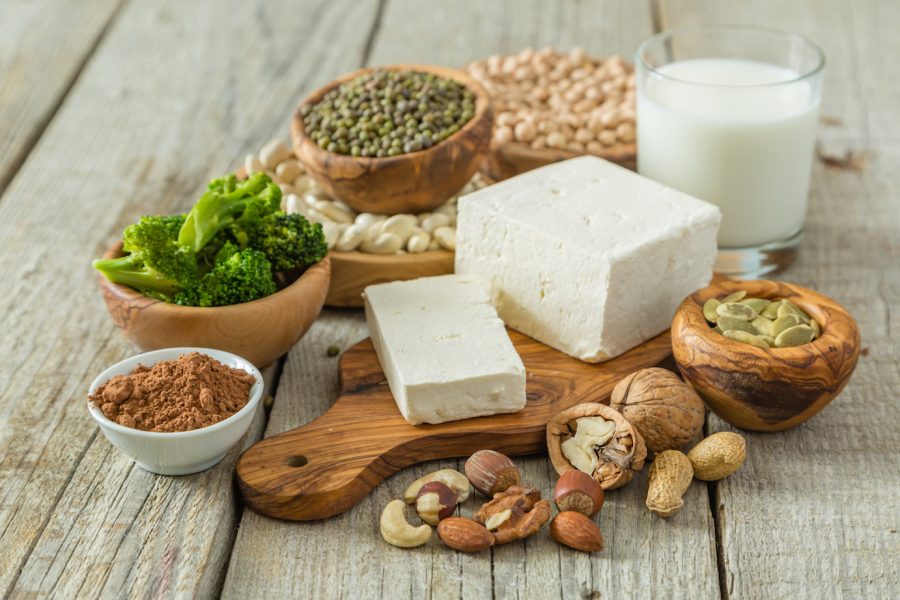Why vegetarianism? Benefits of a meatless society
Variety of vegetarian cuisine including vegetables, tofu, nuts, and spices.
April 2, 2022
Many cultures’ traditional meals are centered around meat; however, studies have shown that eating meat can be detrimental to both individuals and societies. A vegetarian or meatless diet has significant benefits ranging from increased physical health of individuals to overall economic benefits. Society would be bettered by a mass switch from meat-eating to vegetarianism because of the significant and numerous ways in which meat-eating harms humans, animals, the environment, and the economy.
There are many medical concerns for individuals with meat-heavy diets. People who eat meat are shown to have higher cholesterol levels, increased risk of developing cancer, cardiovascular disease, various heart problems, obesity, type two diabetes, as well as pneumonia. In general, vegetarians eat more fresh fruits and vegetables, which provide necessary nutrients such as antioxidants, vitamin C, fiber, and potassium. Despite these substantial benefits, only three point two percent of Americans follow a vegetarian diet. In the United States alone, one person dies of cardiovascular disease every 36 seconds. With statistics such as that, there needs to be a great change in society’s relationship with meat.
Along with the physical benefits of a vegetarian diet, there are a vast number of environmental benefits as well. Meat production, especially due to factory farming, significantly harms the Earth. Meat production increases the rate of climate change, pollution, water consumption, and more. Raising livestock for meat produces more greenhouse gasses than all personal vehicles combined. Factory farming also greatly contributes to water, land, and air pollution. Animal waste can also destroy topsoil, making it difficult or impossible for farmers to grow produce. Raising livestock is extremely wasteful of potable water. It takes a large amount of water to grow all of the food that farm animals eat, but the animals produce a small amount of meat. If farmers stopped raising livestock for meat, not only would it save water, but the amount of produce not being fed to animals could potentially solve world hunger. By mass amounts of people subscribing to a vegetarian diet, climate change could be slowed immensely, if not stopped.
In relation to the environmental effects of meat-eating, there are economic benefits to having less people eat meat. One study found that if every American switched to a vegetarian diet, there would be thirty-five billion dollars in environmental savings and two hundred and fifty-eight point six billion dollars saved in total. In many ways, a vegetarian diet can also be more cost effective for an individual as well. It has been found that on average, vegetarians save over seven hundred dollars a year on grocery bills compared to the average person who consumes meat.
Perhaps one of the biggest reasons for going vegetarian is the ethics behind it. Inhumane factory farms account for most of the meat on grocery store shelves. They are intended to maximize profits at the expense of the quality of life for the animals. Many people would argue that all meat consumption is unethical, whether it be from factory farms or not. Animals can feel pain and suffering because of their complex nervous system; because of this, killing or inflicting pain on an animal for pleasure is inherently unethical. Many people even argue that it is ethical to eat some animals but not others. The same people that eat cows, pigs, chickens, turkeys, veal, etc. will protest other cultures eating dogs or other animals because they view dogs as pets and therefore unethical to eat. This is an extremely common but flawed thought-process. The reality is that killing and eating animals is always cruel and inhumane, despite them coming from factory farms or traditional farms, because humans do not have the right to take the life of another living being for something as insignificant as dinner.
Vegetarianism is often viewed as a newer trend or dietary restriction; however, many cultures are rooted in vegetarianism and have been practicing various types of meat restriction for centuries. In the 1930s when the Rastafari movement began in Jamaica, they began eating food called Ital. Vegetarianism has continued as a large part of food culture in Jamaica even today. Ethiopian vegetarianism is mainly derived from the Orthodox Christianity prevalent in the country. During religious fasting days, much of the country doesn’t serve or eat meat. India has the highest number of vegetarians in the world, with over four hundred million people identifying as such. Israel even goes one step further, with the highest percentage of vegans in the world.
There are many different resources for aspiring vegetarians. From educational videos about the realities of factory farming to meatless recipes, there are many ways to help people gradually make the switch from eating meat to living without it. By making vegetarianism more accessible and realistic for individuals, the world can greatly benefit in all of the ways mentioned earlier and more.



